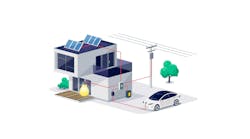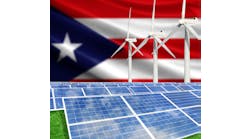President Biden’s decision last week to delay a disruptive solar tariff inquiry from the US Department of Commerce for two years and boost US solar production came as a relief to the storage, solar and microgrid industries.
Members of these industries said they were seeing higher prices, long delays and less investment that threatened the industries’ ability to complete projects and start new ones. But even with Biden’s move, the coast isn’t entirely clear. The two-year pause means that future tariffs are still a possibility.
Solar and energy storage are key ingredients in microgrids, helping microgrid owners cut greenhouse gas emissions and green their communities and the grid.
Impact of solar tariff inquiry
In a recent survey of 700 solar companies by the Solar Energy Industries Association (SEIA), respondents said that more than 300 projects were being canceled or delayed because of the initiation of the tariff case, said Dan Whitten, vice president of public affairs at SEIA. And, in Oregon, Angela Crowley-Koch, executive director of the Oregon Solar and Storage Industries Association (OSSIA), said solar prices had increased by about 25% because of the Department of Commerce inquiry, which posed problems for projects already under contract. In addition, a 3-MW community solar project was canceled.
“It’s not just a few companies losing money; it’s about delays for community members waiting to start subscriptions for clean power,” said Crowley-Koch.
Needed reprieve, but …
For more than five weeks, the Department of Commerce has been investigating solar modules from four Southeast Asian nations, a probe that led to a halt in imports of solar components and panels and a reported diversion of products to other countries, said Allison Nyholm, vice president of policy for the American Council on Renewable Energy. The inquiry also hindered the deployment of energy storage technologies, she said.
Last week, Biden announced that he would delay the Commerce Department inquiry for two years and authorize the use of the Defense Production Act to accelerate domestic production of clean energy technologies, including solar panel parts.
“The administration’s expected decision will come as a much needed reprieve for many stalled solar projects — many of which include microgrid and energy storage systems — but will only provide short-lived certainty to the industry,” said Matt Roberts, director of market development at Blue Planet Energy. A two-year pause is significant for many project developers, who operate on thin margins, he said. But larger installations can have multiyear development cycles and the prospects of future tariffs still looms, he added.
Cameron Brooks, executive director of Think Microgrid, a microgrid advocacy group, said that the supply chain impacts of the inquiry have been severe and that the Biden administration’s move will increase in the near term the availability of solar, which is a key component of many microgrid deployments today.
Join Microgrid Knowledge, Siemens, EPRI and Commonwealth Edison at 2 p.m. June 16 for a webinar on the benefits of grid sectionalization. Register now.
And A.J. Perkins, president and CEO of microgrid developer Instant On, said the Biden administration’s move will help companies like his move forward.
“The use of the Defense Production Act to boost manufacturing in clean energy technologies will help develop a robust, US-based advanced energy manufacturing industry that can bolster the middle class, revitalize communities and expand economic opportunities while helping the US to become energy independent,” Perkins said. Many of his company’s solar, fuel cell and battery storage suppliers are looking to take advantage of the announcement and move toward localized manufacturing or expanding their US manufacturing capabilities, he said.
Perkins has seen solar prices increase by 10% to 40% and has experienced two- to four-week delays in acquiring solar equipment. The company had scaled back using solar in its microgrids by at least 60% in response to the price increases and delays. Instead, the company has been designing more fuel cells and gas turbines into its microgrids, as well as beginning to integrate green hydrogen, Perkins said.
Compounded by pandemic
James Geshwiler, co-founder and chief strategy and investment officer for Catalyze, a developer and owner of energy transition technologies, said that business challenges from the pandemic — which affected supplies of commodities such as steel — added to the solar industry’s woes.
“President Biden’s pause on tariffs should give the market some certainty for now and help alleviate the immediate disruption, but the investigation exacerbated other supply chain issues and it may take a while for the supply to fully catch back up,” said Geshwiler.
The tariff investigation compounded challenges already brought about by the pandemic and other global events, he said. Industry members who had not secured their panel inventory and were relying on the existing market saw their projects slow down or come to a standstill, he added.
While the Biden administration’s announcement isn’t a cure-all, it will help move the solar, storage and microgrid industries forward for now.
In fact, in Oregon, Biden’s announcement created excitement, said Crowley-Koch of OSSIA.
“We’re very excited about the president’s effort in the tariffs. While not a complete resolution, the 24 months will allow Oregon solar projects to continue and allow time for the market to find a solution,” she said.
Track news about policy affecting microgrid industries. Subscribe to the free Microgrid Knowledge Newsletter.








